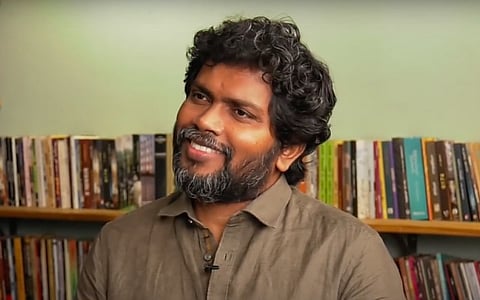
- Reviews
- Power List 2024
- Cannes 2024
- In-Depth Stories
- Web Stories
- News
- FC Lists
- Interviews
- Features
- FC SpecialsFC Specials

After Kabali and Kaala, Pa. Ranjith's next Sarpatta Parambarai, starring Arya, released directly to OTT on Amazon Prime Video. In this interview with Baradwaj Rangan, he talks about his writing process, working collaboratively with writer Thamizh Prabha, and the political backdrop of Sarpatta Parambarai. Edited Excerpts…
You did a lot of research for Sarpatta. This is a screenwriting question: with all that research, how do you choose the interesting ones for the film? What's your process of writing?
I write the story first. A world has to interest and affect me. I begin to live in that world. I write out the story in about sixty pages. During research for example, I met an elderly person called Ramadas who was hard of hearing. He used to be a fighter. I didn't try to use his image exactly but tried to depict his world. It's not a copy. I've observed a lot of things from my life directly and recreated them using my form. Only then an artist can be true to the emotion. A lot of incidents that happen in the film have happened in my own life, and aren't specific to that mileu alone.
I fit events from my observation and research into the story. But also, the people I'm researching provide inspiration for the story. Rangan Vaathiyar is based on a person I knew. I fit him into the character. It's like a game during writing. It doesn't come from the thinking process but once you start writing, people will start coming to your mind.
I first make notes on a piece of paper. I then write characters. In an earlier draft, Rangan Vaathiyar had two wives and Kabilan and Vetri were sons by each of them. But I didn't want to bring aspects of heredity into the film. Such philosophical and political questions torture me a lot. Even if it's interesting, my mind will ask me to remove such elements. After I finish the story, I write the screenplay when I break down different areas of the film. I check whether the usual drama in the film is interesting. In one version, Rangan Vathiyaar dies. Then I felt that he should never die.
It's not a documentary and I don't want to discuss anybody's personal lives. I just want to use the information I have for the story, as much as it's needed.
You said you wrote the story. How did Tamizh Prabha come in?
So, I write the story out like a novel. Then I separate out the dialogues and adapt it to a screenplay pattern. I actually have a story of about 80 pages that's not yet a screenplay. It reads like a novel now. I'll make it a screenplay only when I make a film.
Tamizh Prabha writes a version which I then revise. I really liked his writing or I couldn't have entered into it. I felt he was a writer who understood me, for the first time. Gradually, over a long time, we wrote the script together.
You mentioned that since a lot of people had set films in the 80s you chose the 70s. There were important events around the DMK and AIADMK, like MGR's exit from the DMK. But you chose to focus on the Emergency, the fall of the DMK and the rise of MGR. Could you explain this choice?
I felt political changes during the Emergency were important. My grandfather belonged to the DMK and my father to the AIADMK but later he had a problem with my uncle and switched to the DMK — even though he was an MGR fan. That incident was my inspiration. Vetriselvan is an MGR fan in the script but I didn't want the story to become that. It was just an ambience. DMK's role during the Emergency was very important for its opposition. I felt Rangan Vaathiyar's importance would be enhanced if he belonged to the DMK.